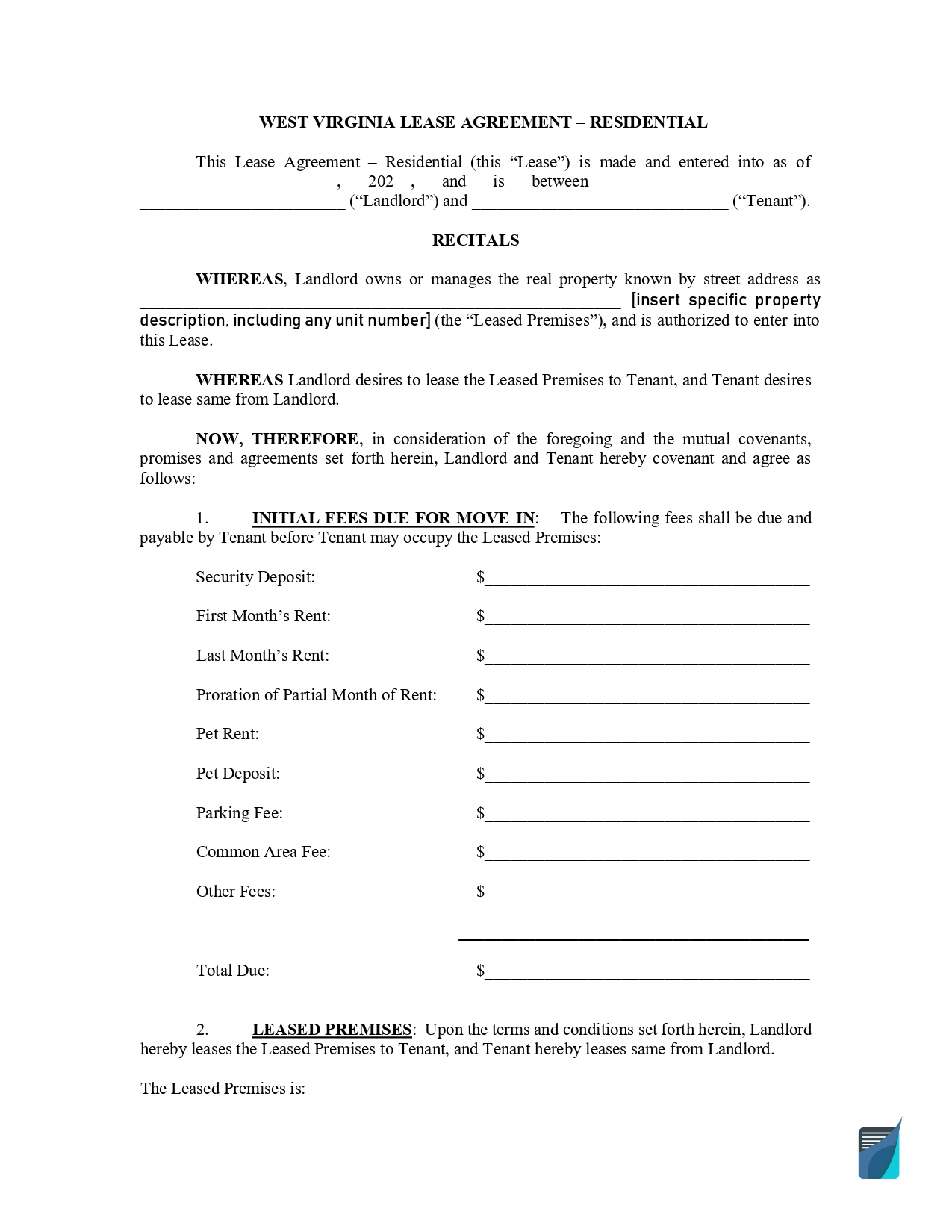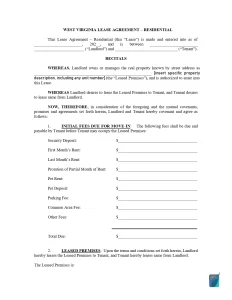West Virginia Rental Lease Agreement Forms
The West Virginia rental lease agreement forms are legal documents that outline the terms and conditions between landlords and tenants regarding the leasing of residential property. These forms specify details such as the duration of the lease, monthly rent amount, security deposit requirements, and pet and maintenance policies.
West Virginia law mandates that landlords disclose specific information in the lease, such as the identity of anyone authorized to act on their behalf. Additionally, all West Virginia lease agreements must comply with state-specific regulations on security deposit limits and conditions for withholding or returning deposits. Properly executing rental lease agreement forms ensures legal protection for both landlords and tenants.

Build Your Document
Answer a few simple questions to make your document in minutes
Save and Print
Save progress and finish on any device, download and print anytime
Sign and Use
Your valid, lawyer-approved document is ready
West Virginia Laws and Lease Requirements
Chapter 37, Article 6 of the West Virginia Code provides the legal framework for the landlord-tenant relationship in this state. At the same time, Article 6A regulates residential rental security deposits.
Security Deposit
In West Virginia, the statutes concerning security deposits provide significant freedom to landlords regarding the amount that can be charged. Specifically, West Virginia Code, Section 37-6A-2 does not set a maximum limit on the security deposit that a landlord may request from a tenant.
According to the same section, upon the conclusion of a tenancy, the landlord must return any remaining security deposit to the tenant within the designated notice period. Section 37-6A-1 defines “notice period” as 60 days from the end of the tenancy or within 45 days after a new tenant moves in (whichever period is shorter). The permissible uses of the security deposit by the landlord include, but are not limited to:
- Payment of overdue rent and any associated late fees as specified in the lease.
- Compensation for damages due to tenant negligence, excluding normal wear and tear.
- Covering unpaid utilities that the tenant was responsible for under the lease terms.
- Costs related to removing and storing the tenant’s belongings, with provisions for disposal under certain conditions.
- Other agreed-upon charges specified within the rental agreement, such as payments for repairs done by third-party contractors.
When damages exceed the security deposit, and third-party contractor services are needed, the landlord must inform the tenant in writing within the prescribed notice period. If such notice is provided, the landlord is granted an additional fifteen days to furnish a detailed breakdown of the damages and repair costs.
It is the tenant’s responsibility to provide a valid forwarding address to facilitate the return of the deposit. If delivery fails and the item is returned, the landlord must hold the deposit for an additional six months to allow the tenant to claim it.
Mandatory Disclosures
One key federal requirement is the disclosure of lead-based paint for properties built before 1978. Landlords must inform prospective tenants about the potential presence of lead-based paint and provide them with an EPA-approved information pamphlet on lead poisoning prevention.
Furthermore, any non-refundable fees, such as pet or application fees, must be clearly stated in the lease agreement.
Landlord’s Right of Entry
According to the West Virginia Code, Section 37-6-6, while landlords are encouraged to provide tenant notice, the law does not specify a minimum required notice period. However, it is customary and generally accepted that a 24 to 48-hour notice is provided before entry.
West Virginia Rental Lease Agreement Form Details
| Document Name | West Virginia Rental Lease Agreement Form |
| Other Names | WV Rental Lease, West Virginia Residential Lease Agreement |
| Relevant Laws | West Virginia Code, Chapter 37, Article 6 |
| Security Deposit Amount | Not specified |
| Security Deposit Return | Forty five (45) days from vacating the property or sixty (60) days after the lease ends |
| Avg. Time to Fill Out | 18 minutes |
| # of Fillable Fields | 119 |
| Available Formats | Adobe PDF |


We provide a wide range of important West Virginia documents to anyone in quest of convenience when handling various agreements, contracts, and other paperwork in the state.